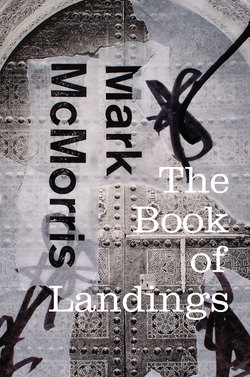The Book of Landings

Реклама. ООО «ЛитРес», ИНН: 7719571260.
Оглавление
Mark McMorris. The Book of Landings
Отрывок из книги
The Book of Landings
WESLEYAN UNIVERSITY PRESS MIDDLETOWN, CONNECTICUT
.....
In my elaboration, an entrepôt is not a proper place, but a noman’s-land. Entrepôt exists apart from—on the outside of, or in between—places where national identity takes root and where nations have their durable geographical dwelling. Entrepôt punctuates the passage of bodies in space from one location to another. As such, the space of entrepôt is related to the refugee camp and to the ground bordered but not occupied by warring factions. The area around the port of a city is an entrepôt: polyglot, fertile ground for the emergence of hybrid tongues and argots. A slave ship is an especially violent entrepôt, a node in a network of other sites of gathering and dispersal: the dungeon, where slaves were temporarily housed on the West Coast of Africa; and the auction blocks of the Americas, whence they were scattered again to the plantations. These spaces—refugee camp, no-man’s-land, seaport, ship, auction block, plantation—are abstracted from the geography of the nation-state. Dedicated to flux and transition, they frame the passage of bodies from nation to exile, but decline to offer the privileges of a stable society. For in the hiatus between previous origin and future destination there is a meeting of discrepant horizons. Gathered together briefly at the entrepôt is a heterogeneity of national costumes, which mingle and exert a reciprocal influence on one another, and which then emerge from the exit as hybrid or fragmentary forms. As a “no-place,” entrepôt is related to paradise or utopia. But utopia, a vision of perfected polis, is the negative face of the system of transit, the inverse of entrepôt. Utopia is the destination longed for, but never attained, the form never concluded, in the passage.
In Fragments from a Time before This, the rectangles share a lexicon of entrepôt—that is to say, words dealing with exploration, conquest, warfare, migration, nomadism, transitional spaces like markets, sacred passages like thresholds and crossroads, voyages in time and space, together with words drawn from enterprises devoted to describing or facilitating movement, as, for example, the study of geography, cartography, navigation, even mathematics and cosmology. Because of this lexicon, the rectangles become vehicles for various specific metaphors: the grid of 12 rectangles serves to trap or arrest objects (words) in their flight; the grid reduces the chaos of forced migration, propelled by violent episodes such as wars, to the orderliness of a formal system, an abstract design; the grids clean up the situation, and impose stability on identities that are transient; the grids are formalized abstractions of various kinds of terrain, over which migrations take place. Hence, the borders of the grid are open to the border-spaces of the page, and open to the texts on other pages of the book. As the alphabet of the trilogy, words from the lexicon can “migrate” to other poems in both Volume II and III, evincing meanings from their usage in those contexts and suggesting another metaphor—another function—for the grids: origins, places to begin from, to go astray from.
.....